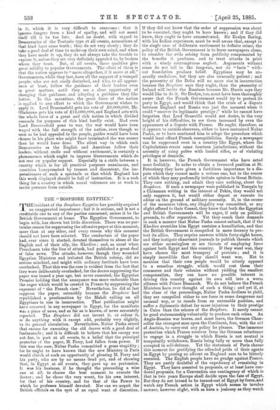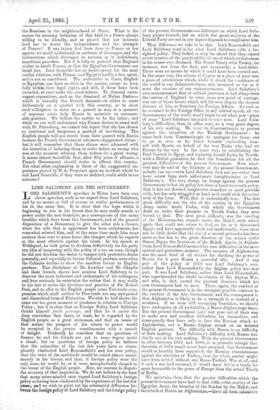THE " BOSPHORE EGYPTIEN." T HE incident of the Bosphore Egyptien
has possibly acquired an exaggerated importance ; but it is serious, and is not a creditable one to any of the parties concerned, unless it be the British Government at home. The Egyptian Government, to begin with, has shown but little discretion. There was no particular reason for suppressing the offensive paper at this moment, more than at any other, and every reason why this moment should not have been selected. The conductors of the paper had, ever since it started, devoted themselves to abuse of the English and of their ally, the Khedive ; and, as usual when Frenchmen take the line of attack, had published a great deal of false news. The attacks, however, though they wounded Egyptian Ministers and irritated the British colony, did no serious mischief, and might with ordinary fortitude have been overlooked. That this was the case is evident from the fact that they were deliberately overlooked, for the decree suppressing the paper was issued a year ago, but never executed, the Egyptian Premier holding that the annoyance was more endurable than the anger which would be created in France by suppressing the exponent of "the French view." Nevertheless, he did at last suppress the paper, ostensibly because the Bosphore had republished a proclamation by the Mahdi calling on all Egyptians to rise in insurrection. That publication might have occurred in any newspaper in Egypt, for the manifesto was a piece of news, and so far as is known, of news accurately reported. The Bosphore did not invent it, or colour it, or do anything with it except add, probably very slightly, to its general circulation. Nevertheless, Nubar Pasha seized that excuse for executing the old decree with a good deal of fanfaronade ; and it is difficult to believe that his energy was not due, in part at all events, to a belief that the principal protector of the paper, M. Ferry, had fallen from power. If this was the case, Nubar Pasha committed a gross stupidity ; for he ought to have known that the new Ministry in Paris would clutch at such an opportunity of pleasing M. Ferry and his party, who are by no means dead yet, and of showing that, in Egypt at all events, they gave up no pretension. It was his business, if he thought the proceeding a wise ene at all, to choose the best moment to execute the decree ; and he chose the very worst, for his own interest, for that of his country, and for that of the Power to which he professes himself devoted. Nor can we acquit the British officials on the spot of an equal want of discretion. If they did not know that the order of suppression was about to be executed, they ought to have known ; and if they did know, they ought to have remonstrated. Sir Evelyn Baring, with his Indian experience, must be well aware that, except in the single case of deliberate excitement to definite crime, the policy of the British Government is to leave newspapers alone, to consider the evils arising from publicity compensated by the benefits it produces, and to treat attacks in print with a wisely contemptuous neglect. Arguments without sense do not tell in the long-run, nor do " facts " without foundation produce belief. Egyptians may be unusually credulous, but they are also unusually patient ; and the peasantry of the Delta will no more rise in insurrection because the Bosphore says they ought, than the peasantry of Ireland will invite the Russians because Mr. Harris says they would like to do it. Sir Evelyn, too, must have been thoroughly aware that the French Government would try to protect its party in Egypt, and would think that the crisis of a dispute between England and Russia was just the moment when it could "recover its legitimate prestige ;" while he cannot have forgotten that Lord Granville would not desire, in the very height of his difficulties, to see them increased by even the appearance of a dispute with France. He ought, therefore, as it appears to outside observers, either to have restrained Nubar Pasha, or to have cautioned him to adopt the procedure which would least offend French susceptibilities. Surely a newspaper can be suppressed even in a country like Egypt, where the Capitulations create some fourteen jurisdictions, without the necessity of using police with loaded rifles, or of violating privileges of domicile.
It is, however, the French Government who have acted most foolishly. In order to obtain a favoured position at St. Petersburg they have given a factitious importance to a dispute which they cannot make a serious one, but in the course of which they may profoundly irritate opinion in Great Britain. They care nothing, and admit they care nothing, about the Bosphore. If such a newspaper were published in Tonqnin by a Chinaman writing in the interest of Pekin, they would not only suppress it, but would either deport or execute its editor on the ground of military necessity. If, in the course of the measures taken, any illegality was committed, or any slight offered to their Consul, they know that both the Egyptian and British Governments will be eager, if only on political grounds, to offer reparation. Yet they couch their demands in such a manner that Nubar Pasha cannot submit, that if the Khedive overrides him Egypt sustains a humiliation, and that the British Government is compelled in mere decency to pro-. tect its allies. They require answers within forty-eight hours, and they instigate chauvinist journals to publish threats which are either meaningless or are threats of employing force against both Egypt and this country. If they want war, they have chosen the most trumpery of pretexts ; and it is simply incredible that they should want war. Not to mention that their own people would be utterly opposed to a senseless struggle, which would cost them their commerce and their colonies without yielding the smallest compensation, they can have no possible 'interest in driving this country against its own will into a warm alliance with Prince Bismarck. We do not believe the French Ministers have ever thought of such a thing ; and yet if, at the close of the proceedings, Nubar Pasha declines to yield, they are compelled either to use force in some dangerous and unusual way, or to recede from an untenable position, and suffer a diplomatic defeat far more injurious to their prestige in Cairo than the seizure of the Bosphore. It surely cannot be good statesmanship voluntarily to produce such crises. An Anglo-Russian war leaves, and must leave, the German Chancellor the strongest man upon the Continent, free, with the aid of Austria, to carry-out any policy he pleases. The immense protection which France receives from the German reluctance to engage in a struggle in which Russia is not neutral is temporarily withdrawn, Russia being fully or more than fully occupied in self-defence. Yet the statesmen of Paris choose this moment for gratifying the offended pride of their agents in -Egypt by passing an affront on England sure to be bitterly resented. The English people have no grudge against France. They are partly doubtful of the expediency of remaining in Egypt. They have assented to proposals, or at least have condoned proposals, for a Convention one contingency of which is that in two years Europe shall decide upon the fate of Egypt. But they do not intend to be turned-out of Egypt by force, and watch any French action in Egypt which seems to involve menace, however slight, with as keen a jealousy as they watch
the Russians in the neighbourhood of Herat. What is the excuse for arousing irritation of this kind in a Power always willing to be friendly, and so pliced that her interests lead her to desire the independence and the strength of France ? If any injury had been done to France or her agents, we could understand an outburst of ill-temper, and the indiscretions which ill-temper in nations, as in individuals, sometimes provokes. But it is folly to pretend that England wishes to insult France, or that the Egyptian Government can insult her. Lord Granville has no desire except for the most cordial relations with France, and Egypt is hardly a free agent, and is not so considered. The authorities in Cairo, English or Egyptian, can have no wish in the matter, except to keep fully within their legal rights, and will, if these have been exceeded, at once make the usual redress. To demand extravagant reparations, such as the dismissal of Nubar Pasha— which is virtually the French demand—is either to enter deliberately on a quarrel with this country, or to show such willingness to enter on a quarrel as may at a moment of supreme crisis help Russia to maintain an unreasonable position. We believe the motive to be the latter ; and while we can well understand why France desires to stand well with St.. Petersburg, we cannot but regret that she has chosen so irrational and dangerous a method of interfering. The English people will not recede from their quarrel with Russia because the French Government advances exaggerated claims ; but it will remember that those claims were advanced with the intention cf inducing them to retire before an enemy who was at the moment refusing them redress for a great wrong. It seems almost incredible that, after fifty years of alliance, a French Government should desire to affront this country. Yet what other explanation is there of the exaggerated importance placed by M. de Freycinet upon an incident which he and Lord Granville, if they were so inclined, could settle in ten minutes ?



































 Previous page
Previous page